冬奥会知识普及英语
冬奥会英语词汇大全
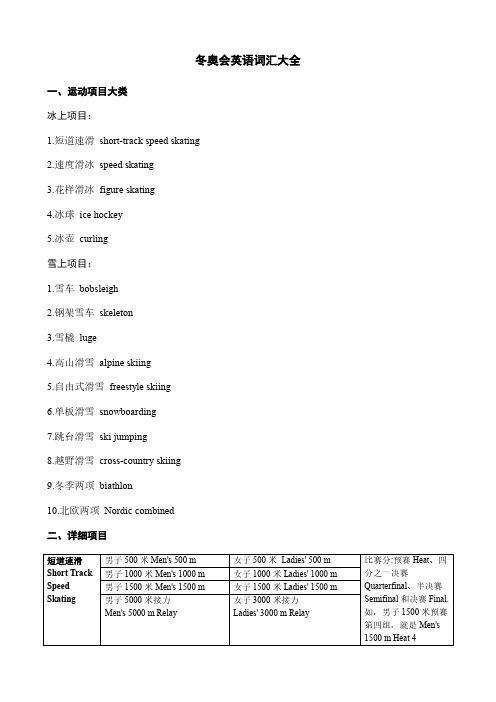
冬奥会英语词汇大全一、运动项目大类冰上项目:1.短道速滑short-track speed skating2.速度滑冰speed skating3.花样滑冰figure skating4.冰球ice hockey5.冰壶curling雪上项目:1.雪车bobsleigh2.钢架雪车skeleton3.雪橇luge4.高山滑雪alpine skiing5.自由式滑雪freestyle skiing6.单板滑雪snowboarding7.跳台滑雪ski jumping8.越野滑雪cross-country skiing9.冬季两项biathlon10.北欧两项Nordic combined二、详细项目三、动作技巧四、装备:手套Gloves头盔Helmet护颈Neck Protection连身服Racing Suit护腿板Shin Protection冰鞋Boots冰刀Blades五、其他常用词汇吉祥物Mascot冰墩墩Bing Dwen Dwen雪容融Shuey Rhon Rhon火炬传递Torch Relay奥林匹克圣火Olympic flame冰丝带The Ice Ribbon冬奥会Winter Olympics Games冬残奥会WinterParalympic Games国际奥林匹克委员会The International Olympic Committee (IOC) 一起向未来Together for a SharedFuture体育精神Sportsmanship奥运精神the Olympic Spirit业余爱好者Amateur奥运场馆Olympic venue金牌Gold medal冰场Ice rink冰刀Blades奥运会代表团Olympic Delegation奥运会运动员Olympicathlete残奥会运动员Paralympicathletes火炬点燃仪式Torch Lighting Ceremony主办国Host Country主办城市Host City奥运村The Olympic Village开幕式Opening Ceremony闭幕式Closing Ceremony六、运动项目历史1.速度滑冰Speed skatingSpeed skatingis a competitive form of ice skating in which the competitors race each other in travelling a certain distance on skates. Types of speed skating are long track speed skating, short track speed skating, and marathon speed skating. In the Olympic Games, long-track speed skating is usually referred to as just "speed skating", while short-track speed skating is known as "short track". The ISU, the governing body of both ice sports, refers to long track as "speed skating" and short track as "short track skating".2.短道速滑Short Track Speed SkatingShort track speed skating is only about 100 years old and a product of North America. Speed skating, however, dates back to 13th century Holland. Short track speed skating originated in Canada and the United States in 1905 with the first known competition having taken place in 1909. By he 1920s and 30s, the sport was gaining popularity in Great Britain, Japan, France, Belgium and Australia. While short track speed skating became part of the International Skating Union (ISU) in 1967, it wasn't until 1976 that official ISU competitions began.3.花样滑冰Figure SkatingFigure skating is a sport and activity in which individuals, duos, or groups perform on figure skates on ice. It was the first winter sport included in the Olympics, in 1908. The four Olympic disciplines are men's singles, ladies' singles, pair skating, and ice dancing. Non-Olympic disciplines include synchronized skating and four skating. From intermediate through senior-level competition, skaters generally perform two programs (short and long) which, depending on the discipline, may include spins, jumps, moves in the field, lifts, throw jumps, death spirals, and other elements or moves.4.冰球Ice HockeyIce hockey is a contact team sport played on ice, usually in a rink, in which two teams of skaters use their sticks to shoot a vulcanized rubber puck into their opponent's net to score points. Ice hockey teams usually consist of four lines of three forwards, three pairs of defensemen, and two goaltenders. Normally, each team has five players who skate up and down the ice trying to take the puck and score a goal against the opposing team.5.冰壶CurlingCurling is a sport in which players slide stones on a sheet of ice towards a target area which is segmented into four concentric circles. It is related to bowls, boules and shuffleboard. Two teams, each with four players, take turns sliding heavy, polished granite stones, also called rocks, across the ice curling sheet towards the house, a circular target marked on the ice. Each team has eight stones. The purpose is to accumulate the highest score for a game; points are scored for the stones resting closest to the centre of the house at the conclusion of each end, which is completed when both teams have thrown all of their stones. A game usually consists of eight or ten ends.。
冬奥会课件PPT英语

延时符
Winter Olympics Environmental Protection and Sustainable Development
Air pollution control
Implementing strict emission standards for vehicles and Banning high polluting fuels
China is also expected to host the Winter Olympics again in the future, likely in Beijing or Zhangjiakou
With the development of winter sports in China, more people are expected to participate in winter sports activities, promoting the development of winter sports in China
Integration of Winter Olympics and Art: As a sports event, the Winter Olympics integrates with art, providing artists with rich creative materials and inspiration.
延时符
Contents
目录
Winter Olympics Environmental Protection and Sustainable DevelopmentParticipate in the Winter Olympics and create a better future together
冬奥会知识问答英语作文

冬奥会知识问答英语作文标题,冬奥知识问答英语作文。
The Winter Olympics: A Test of Athletic Skill and National Unity。
Introduction:The Winter Olympics, a global event that captivates millions around the world, showcases the pinnacle of athletic achievement on snow and ice. Hosted every four years, this sporting extravaganza brings together athletes from diverse backgrounds, uniting them in the spirit of competition and camaraderie. Let's delve into the fascinating world of the Winter Olympics through a series of knowledge questions and answers.1. What is the history behind the Winter Olympics?The Winter Olympics trace their origins back to 1924when the first Winter Games were held in Chamonix, France. Initially, it featured a handful of winter sports disciplines, but over the years, it has evolved into a comprehensive showcase of various events, including skiing, snowboarding, ice hockey, figure skating, and many more.2. How are host cities selected for the Winter Olympics?The host city selection process involves a rigorous evaluation by the International Olympic Committee (IOC). Cities submit bids outlining their proposed venues, infrastructure, accommodation, and overall capacity to host the Games. The IOC then conducts thorough assessmentsbefore announcing the chosen host city, taking into account factors like logistical feasibility, sustainability, and global representation.3. What are some iconic venues of the Winter Olympics?Iconic venues such as the Olympic Stadium, Iceberg Skating Palace, and Rosa Khutor Alpine Resort have left indelible marks on the Winter Olympics landscape. Thesevenues not only serve as battlegrounds for athletes but also symbolize the host country's commitment to sporting excellence and legacy building.4. How do athletes prepare for the Winter Olympics?Athletes undergo rigorous training regimes that encompass physical conditioning, technical skill development, mental resilience, and strategic planning. Many dedicate years of their lives to perfecting their craft, often sacrificing personal comforts and enduring grueling challenges in pursuit of Olympic glory.5. What role do Winter Olympics play in fostering global unity?The Winter Olympics transcend national borders, bringing together athletes and spectators from diverse cultures, backgrounds, and ideologies. It serves as a platform for peaceful competition, mutual respect, and understanding, fostering connections that transcend geopolitical tensions and celebrate the common humanityshared by all.6. How do the Winter Olympics promote environmental sustainability?In recent years, the Winter Olympics have made significant strides in promoting environmentalsustainability through initiatives such as eco-friendly venue construction, renewable energy utilization, waste reduction measures, and carbon offset programs. These efforts underscore the importance of protecting our planet while inspiring future generations to become stewards of the environment.7. What are some memorable moments from past Winter Olympics?From Jesse Owens' triumph in 1936 to the "Miracle on Ice" in 1980 and Shaun White's epic snowboarding feats in the 21st century, the Winter Olympics have been a stage for unforgettable moments of triumph, perseverance, and inspiration. These moments not only define sportinggreatness but also embody the resilience of the human spirit.8. How do the Winter Olympics contribute to local economies?Hosting the Winter Olympics provides host cities with opportunities for economic growth, infrastructure development, tourism promotion, and international exposure. While the initial investment may be substantial, the long-term benefits, including increased job opportunities, enhanced infrastructure, and heightened global visibility, can have lasting positive impacts on local communities.Conclusion:The Winter Olympics represent more than just a sporting event; they embody the aspirations, dreams, and collective spirit of humanity. As we celebrate the athleticism and camaraderie showcased on the snow and ice, let us also recognize the profound impact of the Winter Olympics inpromoting unity, diversity, and sustainable development on a global scale.。
冬奥会知识科普 英语作文

冬奥会知识科普英语作文The Winter Olympics Knowledge Introduction。
The Winter Olympics is a sports event that takes place every four years and features various winter sports. The first Winter Olympics was held in Chamonix, France in 1924. Since then, the event has grown in popularity and has become one of the most prestigious sporting events in the world.The Winter Olympics consists of several sports, including skiing, snowboarding, ice hockey, figure skating, and curling. Each sport has its own set of rules and regulations, and athletes from around the world compete against each other in these events.Skiing is one of the most popular sports in the Winter Olympics and includes several subcategories, such as alpine skiing, cross-country skiing, and freestyle skiing. Alpine skiing involves skiing down a slope at high speeds, whilecross-country skiing involves skiing across flat terrain. Freestyle skiing includes various acrobatic moves and jumps.Snowboarding is another popular sport in the Winter Olympics and involves riding on a snowboard down a slope while performing various tricks and jumps. Ice hockey is another popular sport in the Winter Olympics and involves two teams competing against each other on an ice rink.Figure skating is a sport that involves performing various moves and jumps on an ice rink while wearing skates. Curling is a sport that involves sliding stones across anice rink and aiming them at a target.The Winter Olympics is a highly competitive event, and athletes from around the world train for years in order to compete at the highest level. The event is also a great opportunity for countries to showcase their culture and traditions, and many countries use the event as a way to promote tourism.In conclusion, the Winter Olympics is a highlyprestigious sporting event that features various winter sports. The event is a great opportunity for athletes to showcase their skills and for countries to promote their culture and traditions.。
2022北京冬奥会英文知识集锦

Olympic athletes from around the globe are gathered at Beijing’s National Stadium for the Opening Ceremonies, which formally mark the start of the 2022 Winter Games.一起向未来TOGETHER FOR A SHARED FUTUREthe motto of Beijing 2022 主题口号“Together for a Shared Future”is the official motto of the Olympic and Paralympic WinterGames Beijing 2022. The motto represents the power of the Games to overcome global challenges as a community, with a shared future for humankind.奥运会主题口号是奥运会重要的标志性核心内容。
北京2022年冬奥会和冬残奥会主题口号——“一起向未来”!中国向世界发出的诚挚邀约,在奥林匹克精神的感召下,与世界人民携手共进、守望相助、共创美好未来。
motto :主题口号;格言Winter Paralympic Games :冬季残疾人奥林匹克运动会北京2022年冬奥会会徽——冬梦Winter Dream - Emblem of the Olympic Winter GamesBeijing 2022会徽以汉字“冬”为灵感来源,运用中国书法的艺术形态,将厚重的东方文化底蕴与国际化的现代风格融为一体,呈现出新时代的中国新形象、新梦想,传递出新时代中国为办好北京冬奥会,圆冬奥之梦,实现“三亿人参与冰雪运动”目标,圆体育强国之梦,推动世界冰雪运动发展,为国际奥林匹克运动做出新贡献的不懈努力和美好追求。
全民冬奥英语口语练习

全民冬奥英语口语练习### 全民冬奥英语口语练习随着冬季奥运会的临近,越来越多的人开始关注并参与到这一国际盛事中。
对于想要提高英语口语能力的朋友们来说,冬奥无疑是一个极好的实践机会。
以下是一些实用的英语口语练习技巧,帮助你在享受冬奥的同时,也能提升自己的语言技能。
#### 1. 学习冬奥相关词汇首先,了解一些与冬季奥运会相关的基本词汇是必要的。
例如:- Olympic Winter Games: 冬季奥运会- Medal: 奖牌- PyeongChang 2018: 2018年平昌冬奥会- Beijing 2022: 2022年北京冬奥会- Snowboarding: 单板滑雪- Ice Hockey: 冰球- Figure Skating: 花样滑冰#### 2. 观看冬奥比赛并模仿解说观看冬奥比赛时,可以试着模仿解说员的英语表达。
这不仅能提高你的听力理解能力,还能让你学习到如何用英语描述比赛场景。
- He's accelerating down the slope.: 他在坡道上加速。
- She's performing a triple axel.: 她正在做一个三周半跳。
#### 3. 参与英语讨论加入英语讨论组或论坛,与其他冬奥爱好者一起讨论比赛和运动员。
这不仅能提高你的口语交流能力,还能拓宽你的视野。
- I think Team USA has a strong chance of winning the gold.: 我认为美国队有很大机会赢得金牌。
- Who do you think will take home the gold in the men's downhill?: 你认为谁将在男子速降比赛中获得金牌?#### 4. 练习自我介绍和表达观点在英语口语练习中,自我介绍和表达个人观点是非常重要的。
你可以这样练习:- My name is [Your Name], and I'm a huge fan of winter sports.: 我叫[你的名字],我是个冬季运动的超级粉丝。
介绍2022冬奥会英语作文通用5篇
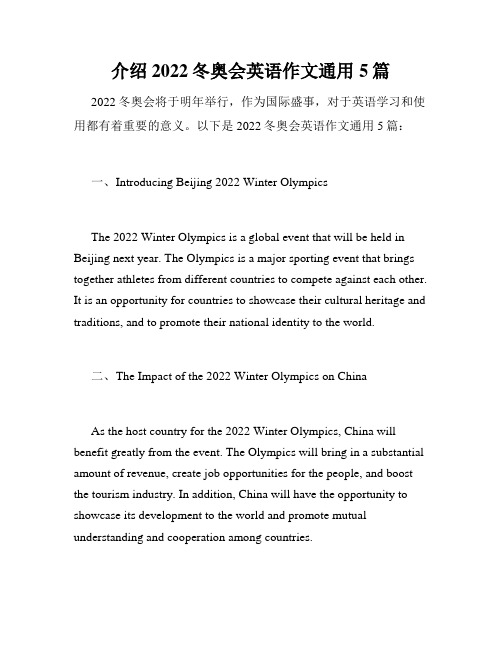
介绍2022冬奥会英语作文通用5篇2022冬奥会将于明年举行,作为国际盛事,对于英语学习和使用都有着重要的意义。
以下是2022冬奥会英语作文通用5篇:一、Introducing Beijing 2022 Winter OlympicsThe 2022 Winter Olympics is a global event that will be held in Beijing next year. The Olympics is a major sporting event that brings together athletes from different countries to compete against each other. It is an opportunity for countries to showcase their cultural heritage and traditions, and to promote their national identity to the world.二、The Impact of the 2022 Winter Olympics on ChinaAs the host country for the 2022 Winter Olympics, China will benefit greatly from the event. The Olympics will bring in a substantial amount of revenue, create job opportunities for the people, and boost the tourism industry. In addition, China will have the opportunity to showcase its development to the world and promote mutual understanding and cooperation among countries.三、The Sports of the 2022 Winter OlympicsThe 2022 Winter Olympics will feature a variety of sports, including skiing, ice skating, bobsledding, and ice hockey. These sports require extensive training, strength, and agility, and are popular around the world. The athletes who will be participating in the games have dedicated their lives to their sports, and their hard work and determination will be on display for the world to see.四、The Importance of Cultural Exchange at the 2022 Winter OlympicsThe 2022 Winter Olympics is not only a sporting event, but also a platform for cultural exchange and understanding. Different countries will have the opportunity to showcase their culture, customs, and traditions. The exchange of cultures will promote mutual understanding and appreciation, and help to build bridges between nations. This is in line with the Olympic spirit of friendship, solidarity, and fair play.五、The Legacy of the 2022 Winter OlympicsThe legacy of the 2022 Winter Olympics will extend beyond the event itself. The facilities built for the Olympics will continue to be used for sports and recreation, and will promote the development of winter sports in China. The event will also leave a cultural and social impact, promoting international cooperation and understanding. The legacy of the 2022 Winter Olympics will be felt long after the event is over.In summary, the 2022 Winter Olympics is a global event that will showcase winter sports and promote cultural exchange and international understanding. It will have a lasting impact on China and the world, and will leave a legacy for future generations.。
冬奥会相关英语知识点总结
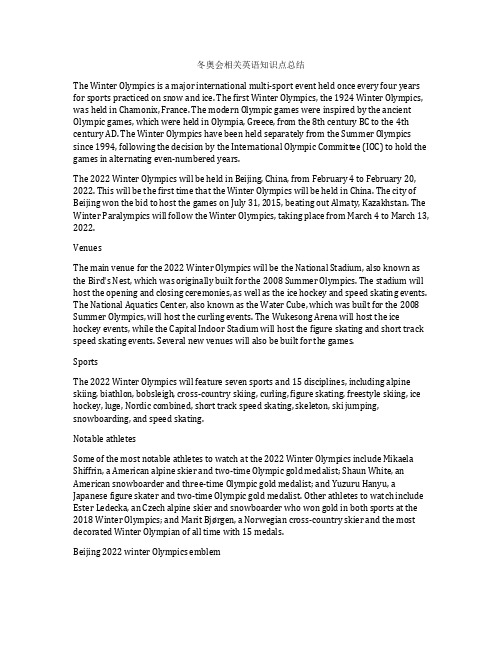
冬奥会相关英语知识点总结The Winter Olympics is a major international multi-sport event held once every four years for sports practiced on snow and ice. The first Winter Olympics, the 1924 Winter Olympics, was held in Chamonix, France. The modern Olympic games were inspired by the ancient Olympic games, which were held in Olympia, Greece, from the 8th century BC to the 4th century AD. The Winter Olympics have been held separately from the Summer Olympics since 1994, following the decision by the International Olympic Committee (IOC) to hold the games in alternating even-numbered years.The 2022 Winter Olympics will be held in Beijing, China, from February 4 to February 20, 2022. This will be the first time that the Winter Olympics will be held in China. The city of Beijing won the bid to host the games on July 31, 2015, beating out Almaty, Kazakhstan. The Winter Paralympics will follow the Winter Olympics, taking place from March 4 to March 13, 2022.VenuesThe main venue for the 2022 Winter Olympics will be the National Stadium, also known as the Bird's Nest, which was originally built for the 2008 Summer Olympics. The stadium will host the opening and closing ceremonies, as well as the ice hockey and speed skating events. The National Aquatics Center, also known as the Water Cube, which was built for the 2008 Summer Olympics, will host the curling events. The Wukesong Arena will host the ice hockey events, while the Capital Indoor Stadium will host the figure skating and short track speed skating events. Several new venues will also be built for the games.SportsThe 2022 Winter Olympics will feature seven sports and 15 disciplines, including alpine skiing, biathlon, bobsleigh, cross-country skiing, curling, figure skating, freestyle skiing, ice hockey, luge, Nordic combined, short track speed skating, skeleton, ski jumping, snowboarding, and speed skating.Notable athletesSome of the most notable athletes to watch at the 2022 Winter Olympics include Mikaela Shiffrin, a American alpine skier and two-time Olympic gold medalist; Shaun White, an American snowboarder and three-time Olympic gold medalist; and Yuzuru Hanyu, a Japanese figure skater and two-time Olympic gold medalist. Other athletes to watch include Ester Ledecka, an Czech alpine skier and snowboarder who won gold in both sports at the 2018 Winter Olympics; and Marit Bjørgen, a Norwegian cross-country skier and the most decorated Winter Olympian of all time with 15 medals.Beijing 2022 winter Olympics emblemThe emblem of the 2022 Winter Olympics is inspired by the Chinese character "冬" (dōng), which means winter. The emblem also resembles a skater, a skier, and the Chinese calligraphic art scroll. The emblem was unveiled on December 15, 2017, and represents a dynamic figure skater on a ribbon of ice.SustainabilityThe 2022 Winter Olympics will focus on sustainability and environmental protection, with the goal of creating a "Green Olympics." Several measures will be taken to reduce the environmental impact of the games, including using renewable energy, promoting low-carbon transportation, and implementing waste reduction and recycling programs. Additionally, the games will focus on promoting winter sports and increasing participation in winter sports in China and around the world.ConclusionThe 2022 Winter Olympics in Beijing will be a historic event for China and for the world. The games will showcase the best winter athletes from around the world, and will provide an opportunity to promote winter sports and the spirit of the Olympic movement. With a focus on sustainability and environmental protection, the 2022 Winter Olympics will leave a positive legacy for future generations.。
冬奥英语实用手册
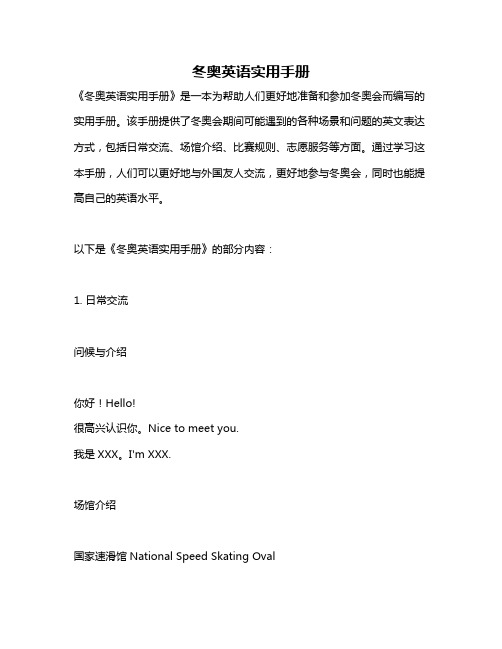
冬奥英语实用手册
《冬奥英语实用手册》是一本为帮助人们更好地准备和参加冬奥会而编写的实用手册。
该手册提供了冬奥会期间可能遇到的各种场景和问题的英文表达方式,包括日常交流、场馆介绍、比赛规则、志愿服务等方面。
通过学习这本手册,人们可以更好地与外国友人交流,更好地参与冬奥会,同时也能提高自己的英语水平。
以下是《冬奥英语实用手册》的部分内容:
1. 日常交流
问候与介绍
你好!Hello!
很高兴认识你。
Nice to meet you.
我是XXX。
I'm XXX.
场馆介绍
国家速滑馆National Speed Skating Oval
国家雪车雪橇中心National Sliding Centre
首钢滑雪大跳台Shougang Ski Jumping Center
2. 比赛规则
短道速滑Short Track Speed Skating
高山滑雪Alpine Skiing
冰壶Curling
3. 志愿服务
我是志愿者I'm a volunteer.
需要我帮忙吗?Do you need any help?
请排队等候Please queue up.
这只是一部分示例内容,实际上《冬奥英语实用手册》包含了更多详细和实用的英文表达方式,以帮助人们更好地参与冬奥会。
介绍冬奥会知识发言稿英语
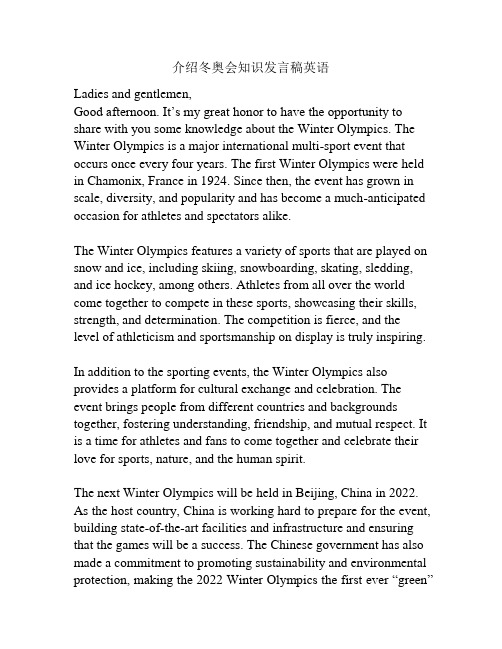
介绍冬奥会知识发言稿英语Ladies and gentlemen,Good afternoon. It’s my great honor to have the opportunity to share with you some knowledge about the Winter Olympics. The Winter Olympics is a major international multi-sport event that occurs once every four years. The first Winter Olympics were held in Chamonix, France in 1924. Since then, the event has grown in scale, diversity, and popularity and has become a much-anticipated occasion for athletes and spectators alike.The Winter Olympics features a variety of sports that are played on snow and ice, including skiing, snowboarding, skating, sledding, and ice hockey, among others. Athletes from all over the world come together to compete in these sports, showcasing their skills, strength, and determination. The competition is fierce, and the level of athleticism and sportsmanship on display is truly inspiring.In addition to the sporting events, the Winter Olympics also provides a platform for cultural exchange and celebration. The event brings people from different countries and backgrounds together, fostering understanding, friendship, and mutual respect. It is a time for athletes and fans to come together and celebrate their love for sports, nature, and the human spirit.The next Winter Olympics will be held in Beijing, China in 2022. As the host country, China is working hard to prepare for the event, building state-of-the-art facilities and infrastructure and ensuring that the games will be a success. The Chinese government has also made a commitment to promoting sustainability and environmental protection, making the 2022 Winter Olympics the first ever “green”games.One of the key objectives of the Winter Olympics is to promote peace and understanding among nations. The event transcends political differences and cultural barriers, bringing people together through the universal language of sports. The Olympics symbolize the power of unity and cooperation, and they serve as a reminder of the potential for collaboration and harmony in our world.The Winter Olympics also provide an opportunity to showcase the beauty and wonder of the natural world. The stunning landscapes, the snow-capped mountains, and the shimmering ice rinks all serve as a backdrop for the incredible feats of athleticism and skill. The event offers a chance to appreciate the majesty of nature and the fragility of our planet, and it reminds us of the importance of protecting and preserving our environment.In conclusion, the Winter Olympics are a celebration of sport, culture, and international cooperation. They bring people together, inspire greatness, and remind us of the power of unity and understanding. As we look ahead to the 2022 Winter Olympics in Beijing, let us all come together to support and celebrate this global event, and let us use it as an opportunity to promote peace, sustainability, and friendship among all nations. Thank you.The Winter Olympics is a celebration of sport, culture, and international cooperation. It brings people together, inspires greatness, and reminds us of the power of unity and understanding. As we look ahead to the 2022 Winter Olympics in Beijing, let us all come together to support and celebrate this global event, and letus use it as an opportunity to promote peace, sustainability, and friendship among all nations. Thank you.。
冬奥会英语知识点总结大全

冬奥会英语知识点总结大全The Winter Olympics is one of the most prestigious international multi-sport events, with athletes from all over the world competing in a variety of winter sports. It is held every four years, and features a wide range of events including alpine skiing, figure skating, ice hockey, and snowboarding. The Winter Olympics is a global celebration of athletic talent, competition, and sportsmanship, and has a long and rich history dating back to the first Winter Games in Chamonix, France in 1924.In this comprehensive guide, we will explore everything you need to know about the Winter Olympics, including its history, sports, venues, athletes, and notable moments.History of the Winter OlympicsThe Winter Olympics began as a way to showcase the growing popularity of winter sports and provide a platform for athletes to compete on an international level. The first Winter Games were held in Chamonix, France in 1924, and featured a total of 16 events in six different sports. Since then, the Winter Olympics have expanded to include a wider range of sports and have grown to become one of the most anticipated events in the global sports calendar.Notable Winter Olympic Host CitiesOver the years, the Winter Olympics have been held in several iconic cities around the world, each providing a unique backdrop for the games. Some of the most notable host cities include:- Innsbruck, Austria (1964, 1976): Innsbruck has hosted the Winter Olympics twice, and is known for its picturesque alpine setting and world-class ski resorts.- Lake Placid, USA (1932, 1980): Lake Placid is famous for hosting the "Miracle on Ice" in 1980, when the US ice hockey team defeated the heavily favored Soviet Union team to win the gold medal.- Vancouver, Canada (2010): Vancouver provided a stunning coastal setting for the Winter Olympics, with events taking place in the city and at the nearby Whistler Blackcomb ski resort.- Sochi, Russia (2014): The 2014 Winter Olympics in Sochi were known for their lavish venues and the controversial doping scandal that overshadowed the games.- Pyeongchang, South Korea (2018): Pyeongchang was the host city for the most recent Winter Olympics, and showcased South Korea's thriving winter sports culture.Winter Olympic SportsThe Winter Olympics feature a diverse range of sports that highlight the athleticism and skill of the competing athletes. Some of the most popular sports include:- Alpine Skiing: Athletes compete in various disciplines such as downhill, slalom, and giant slalom, racing down steep, icy slopes at high speeds.- Figure Skating: This elegant and graceful sport includes singles, pairs, and ice dancing competitions, with athletes performing intricate routines set to music.- Ice Hockey: A fast-paced and physical team sport that features six players per team, competing to score goals on a sheet of ice.- Snowboarding: Athletes use snowboards to navigate through a series of obstacles and perform high-flying tricks in halfpipe, slopestyle, and snowboard cross events.- Bobsleigh: Teams of two or four athletes race down an icy track in a specialized sled, reaching speeds of up to 90 miles per hour.Notable Winter Olympic AthletesThe Winter Olympics have produced many legendary athletes who have left a lasting impact on their respective sports. Some of the most notable Winter Olympic athletes include:- Lindsey Vonn (United States): A dominant force in alpine skiing, Vonn has won multiple Olympic medals and is known for her aggressive racing style.- Shaun White (United States): A snowboarding icon, White has won multiple gold medals in the halfpipe event and is renowned for his innovative tricks.- Yuna Kim (South Korea): One of the most decorated figure skaters in history, Kim's performances have captivated audiences around the world.- Ole Einar Bjørndalen (Norway): With 13 Olympic medals, Bjørndalen is the most decorated Winter Olympian of all time, known for his prowess in biathlon.- Hayley Wickenheiser (Canada): A trailblazer in women's ice hockey, Wickenheiser has won multiple gold medals and is considered one of the greatest female hockey players. Winter Olympic VenuesThe Winter Olympics are held in a variety of venues, ranging from modern stadiums to natural outdoor settings. Some of the most iconic Winter Olympic venues include:- Lysgårdsbakken Ski Jumping Arena (Lillehammer, Norway): This stunning ski jumping facility was built for the 1994 Winter Olympics and provides breathtaking views of the surrounding mountains.- Gangneung Ice Arena (Pyeongchang, South Korea): This state-of-the-art ice arena hosted figure skating and short track speed skating events during the 2018 Winter Olympics.- Whistler Olympic Park (Vancouver, Canada): A sprawling outdoor venue that hosted cross-country skiing, biathlon, and ski jumping events during the 2010 Winter Olympics.- Sochi Olympic Stadium (Sochi, Russia): A massive stadium that hosted the opening and closing ceremonies of the 2014 Winter Olympics, featuring grand performances and fireworks displays.Notable Moments in Winter Olympic HistoryThe Winter Olympics have witnessed countless memorable moments that have captured the world's attention and inspired athletes and fans alike. Some of the most notable moments include:- The "Miracle on Ice" (1980): The US ice hockey team's improbable victory over the Soviet Union team in Lake Placid, which became a symbol of national pride and unity.- Nancy Kerrigan vs. Tonya Harding (1994): A dramatic saga of rivalry and scandal that unfolded in the figure skating competition, leading to widespread media coverage and public fascination.- Lindsay Jacobellis's "Hot-Dogging" (2006): In a controversial move, snowboarder Lindsay Jacobellis lost a gold medal after celebrating prematurely in the snowboard cross event.- Eddie the Eagle (1988): British ski jumper Eddie "The Eagle" Edwards captured hearts around the world with his underdog spirit and determination to compete in the Winter Olympics.- The "Flying Tomato" (2006, 2010): Snowboarder Shaun White's electrifying performances and signature red hair earned him the nickname "The Flying Tomato," and solidified his status as a Winter Olympic legend.Winter Olympics and Cultural ImpactThe Winter Olympics have a profound cultural impact, bringing together people from diverse backgrounds and showcasing the host country's culture and heritage. The games also serve as a platform for diplomacy, as nations come together in the spirit of friendly competition and sportsmanship.In addition, the Winter Olympics have inspired countless athletes to pursue their dreams and push the boundaries of human achievement. The games have also left a lasting legacy in host cities, with new sporting facilities, infrastructure, and tourism opportunities created as a result of hosting the event.In conclusion, the Winter Olympics is a global celebration of athleticism, sportsmanship, and international cooperation. With a rich history, diverse sports, and legendary athletes, the games continue to captivate audiences and inspire future generations of athletes. Whether it's the gravity-defying jumps of a ski jumper, the elegant spins of a figure skater,or the high-speed action of a bobsleigh race, the Winter Olympics never fails to deliver thrills, excitement, and unforgettable moments that will be remembered for years to come.。
冬奥会蕴含的英语知识点
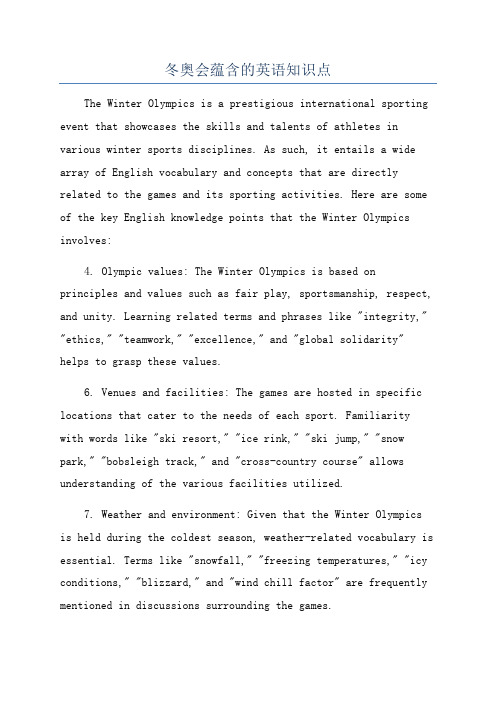
冬奥会蕴含的英语知识点The Winter Olympics is a prestigious international sporting event that showcases the skills and talents of athletes in various winter sports disciplines. As such, it entails a wide array of English vocabulary and concepts that are directly related to the games and its sporting activities. Here are some of the key English knowledge points that the Winter Olympics involves:4. Olympic values: The Winter Olympics is based onprinciples and values such as fair play, sportsmanship, respect, and unity. Learning related terms and phrases like "integrity," "ethics," "teamwork," "excellence," and "global solidarity" helps to grasp these values.6. Venues and facilities: The games are hosted in specific locations that cater to the needs of each sport. Familiarity with words like "ski resort," "ice rink," "ski jump," "snow park," "bobsleigh track," and "cross-country course" allows understanding of the various facilities utilized.7. Weather and environment: Given that the Winter Olympics is held during the coldest season, weather-related vocabulary is essential. Terms like "snowfall," "freezing temperatures," "icy conditions," "blizzard," and "wind chill factor" are frequently mentioned in discussions surrounding the games.10. Cultural aspects: The Winter Olympics showcases the cultural heritage of the host country and includes various ceremonies and performances. Terms such as "opening ceremony," "torch lighting," "national anthem," "traditional costumes," and "showcase of local traditions" are all important to understand the cultural aspects of the event.。
冬奥会英语绘本故事内容

冬奥会英语绘本故事内容With just one year to go to the Olympic Winter Games Beijing 2022, the excitement is growing among winter sportsathletesand fans from around the world. From 4–20 February 2022, the best winter athletes will gather in the Chinese capital as well as Zhangjiakou to compete for 109 gold medals.距离2022年北京冬奥会开幕还有近1年的时间,全世界运动员和体育迷的兴奋之情都越发高涨。
自2022年2月4日至20日,最为出色的冬季项目运动员将会在中国首都北京以及张家口集结,为109块金牌展开争夺。
Here are the top things you need to know as wecount downtowards the next Winter Games.在2022年冬奥会进入倒计时之际,以下这些是你应该了解的。
2022年北京冬奥会比赛项目Events will be held in 15 disciplines across seven sports at the Beijing 2022 Games. There are 109 sets of medals to be awarded, seven more than there were at PyeongChang 2018. New events will be contested inbobsleigh, short track, freestyle skiing, ski jumping, and snowboard.2022年北京冬奥会将进行7个大项、15个分项比赛,比赛共设109块金牌,比2018年平昌冬奥会多7块。
冬奥会的英语知识点总结
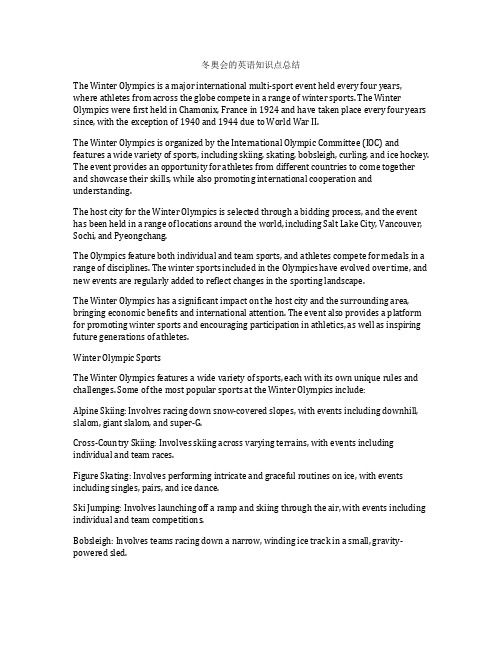
冬奥会的英语知识点总结The Winter Olympics is a major international multi-sport event held every four years, where athletes from across the globe compete in a range of winter sports. The Winter Olympics were first held in Chamonix, France in 1924 and have taken place every four years since, with the exception of 1940 and 1944 due to World War II.The Winter Olympics is organized by the International Olympic Committee (IOC) and features a wide variety of sports, including skiing, skating, bobsleigh, curling, and ice hockey. The event provides an opportunity for athletes from different countries to come together and showcase their skills, while also promoting international cooperation and understanding.The host city for the Winter Olympics is selected through a bidding process, and the event has been held in a range of locations around the world, including Salt Lake City, Vancouver, Sochi, and Pyeongchang.The Olympics feature both individual and team sports, and athletes compete for medals in a range of disciplines. The winter sports included in the Olympics have evolved over time, and new events are regularly added to reflect changes in the sporting landscape.The Winter Olympics has a significant impact on the host city and the surrounding area, bringing economic benefits and international attention. The event also provides a platform for promoting winter sports and encouraging participation in athletics, as well as inspiring future generations of athletes.Winter Olympic SportsThe Winter Olympics features a wide variety of sports, each with its own unique rules and challenges. Some of the most popular sports at the Winter Olympics include:Alpine Skiing: Involves racing down snow-covered slopes, with events including downhill, slalom, giant slalom, and super-G.Cross-Country Skiing: Involves skiing across varying terrains, with events including individual and team races.Figure Skating: Involves performing intricate and graceful routines on ice, with events including singles, pairs, and ice dance.Ski Jumping: Involves launching off a ramp and skiing through the air, with events including individual and team competitions.Bobsleigh: Involves teams racing down a narrow, winding ice track in a small, gravity-powered sled.Snowboarding: Involves racing down a slope on a snowboard, with events including halfpipe, slopestyle, and snowboard cross.Ice Hockey: Involves teams competing to score goals on a ice rink, with events for both men and women.Curling: Involves teams competing to slide stones across the ice and into a target area, with events for both men and women.The Winter Olympics also includes a range of other sports, such as biathlon, speed skating, luge, and skeleton. Each sport requires a high level of skill, athleticism, and dedication from the athletes, and the Winter Olympics provides an opportunity for them to showcase their abilities on the world stage.Host CitiesThe Winter Olympics is held in a different host city every four years, chosen through a bidding process by the International Olympic Committee. The host city plays a crucial role in the success of the event, providing the infrastructure and facilities needed to accommodate athletes, officials, and spectators.The host city is responsible for building and maintaining venues for the various sports, as well as providing accommodation, transportation, and security. The Winter Olympics can have a significant impact on the host city, bringing economic benefits, international attention, and a legacy of world-class athletic facilities.Some of the most iconic Winter Olympics host cities include:Chamonix, France: Hosted the first Winter Olympics in 1924, with events including skiing, skating, and ice hockey.Lake Placid, USA: Hosted the Winter Olympics in 1932 and 1980, with events including bobsleigh, figure skating, and ski jumping.Innsbruck, Austria: Hosted the Winter Olympics in 1964 and 1976, with events including alpine skiing, ski racing, and ice hockey.Lillehammer, Norway: Hosted the Winter Olympics in 1994, with events including cross-country skiing, speed skating, and biathlon.Salt Lake City, USA: Hosted the Winter Olympics in 2002, with events including snowboarding, freestyle skiing, and ice hockey.Vancouver, Canada: Hosted the Winter Olympics in 2010, with events including curling, ice dancing, and ski cross.Sochi, Russia: Hosted the Winter Olympics in 2014, with events including figure skating, snowboarding, and bobsleigh.Pyeongchang, South Korea: Hosted the Winter Olympics in 2018, with events including ski jumping, luge, and skeleton.Each host city brings its own unique culture, landscape, and sporting heritage to the Winter Olympics, providing a backdrop for athletes to compete and spectators to enjoy the festivities.Impact and LegacyThe Winter Olympics has a significant impact on the host city and the surrounding area, bringing economic benefits, international attention, and a legacy of world-class athletic facilities.Economic Benefits: The Winter Olympics can stimulate economic growth through increased tourism, infrastructure development, and job creation. The event brings in athletes, officials, and spectators from around the world, as well as media coverage and sponsorship opportunities.Infrastructure Development: The Winter Olympics requires the construction of venues for a wide range of sports, as well as accommodation, transportation, and security facilities. These new developments can provide long-term benefits to the host city, serving as a legacy for future generations.Community Engagement: The Winter Olympics provides an opportunity for the host city to engage with the local community and promote participation in winter sports. The event can inspire a new generation of athletes, coaches, and volunteers, as well as encouraging healthy and active lifestyles.International Profile: The Winter Olympics raises the international profile of the host city and the surrounding area, showcasing its culture, landscape, and sporting heritage to a global audience. The event can create a lasting legacy of positive associations with the host city.Overall, the Winter Olympics has a profound and lasting impact on the host city and the surrounding area, leaving a legacy of economic, social, and cultural benefits for years to come. The event brings together athletes, officials, and spectators from around the world, promoting international cooperation and understanding through the power of sport.ConclusionThe Winter Olympics is a major international multi-sport event that brings together athletes from across the globe to compete in a range of winter sports. The event is organized by the International Olympic Committee and features a wide variety of sports, with events for both individuals and teams.The Winter Olympics is held in a different host city every four years, chosen through a bidding process, and has a significant impact on the host city and the surrounding area. Theevent brings economic benefits, international attention, and a legacy of world-class athletic facilities, as well as promoting participation in winter sports and inspiring future generations of athletes.The Winter Olympics has a profound and lasting impact on the host city and the surrounding area, leaving a legacy of economic, social, and cultural benefits for years to come. The event brings together athletes, officials, and spectators from around the world, promoting international cooperation and understanding through the power of sport.。
介绍冬奥会滑雪的英语作文
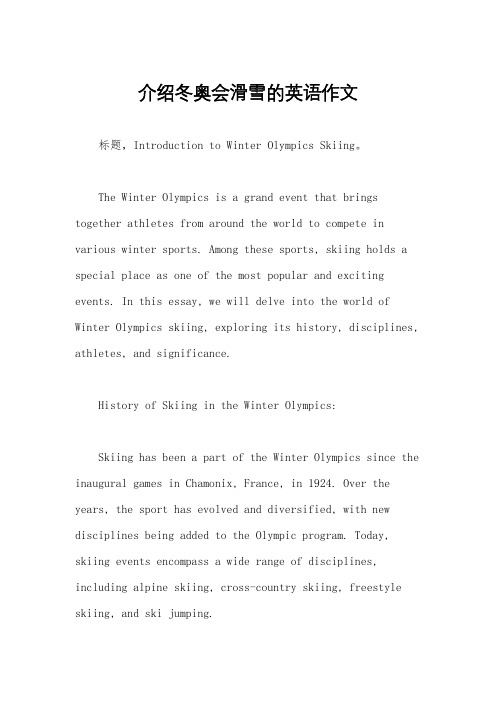
介绍冬奥会滑雪的英语作文标题,Introduction to Winter Olympics Skiing。
The Winter Olympics is a grand event that brings together athletes from around the world to compete in various winter sports. Among these sports, skiing holds a special place as one of the most popular and exciting events. In this essay, we will delve into the world of Winter Olympics skiing, exploring its history, disciplines, athletes, and significance.History of Skiing in the Winter Olympics:Skiing has been a part of the Winter Olympics since the inaugural games in Chamonix, France, in 1924. Over the years, the sport has evolved and diversified, with new disciplines being added to the Olympic program. Today, skiing events encompass a wide range of disciplines, including alpine skiing, cross-country skiing, freestyle skiing, and ski jumping.Disciplines of Skiing in the Winter Olympics:1. Alpine Skiing: Alpine skiing consists of several events, including downhill, slalom, giant slalom, super-G, and combined. Athletes navigate through a series of gates at high speeds, demonstrating precision, agility, and courage.2. Cross-Country Skiing: Cross-country skiing involves racing across varying terrains, including flat tracks and hilly terrain. Athletes use long, narrow skis and poles to propel themselves forward, showcasing endurance and strength.3. Freestyle Skiing: Freestyle skiing is a dynamic and acrobatic discipline that includes events such as moguls, aerials, ski cross, and halfpipe. Athletes perform breathtaking tricks and maneuvers while navigating through challenging courses.4. Ski Jumping: Ski jumping is a thrilling disciplinewhere athletes launch themselves off a ramp and soar through the air before landing. Judges evaluate factors such as distance, style, and landing to determine the scores.Athletes of Skiing in the Winter Olympics:Winter Olympics skiing attracts some of the most talented and dedicated athletes from around the globe. These athletes undergo rigorous training regimens to hone their skills and prepare for the ultimate test of competition. From seasoned veterans to emerging talents, each athlete brings their unique style and strengths to the slopes, captivating audiences with their performances.Significance of Skiing in the Winter Olympics:Skiing is not just a sport; it is a symbol of human achievement, perseverance, and unity. The Winter Olympics provides a platform for athletes to showcase their talents on the world stage, inspiring millions of people around the globe. Moreover, skiing promotes a spirit of camaraderieand sportsmanship among nations, fostering international cooperation and understanding.In conclusion, Winter Olympics skiing is a thrilling and captivating spectacle that continues to captivate audiences worldwide. From its rich history to its diverse disciplines and talented athletes, skiing embodies the essence of the Olympic spirit. As we look forward to future Winter Olympics, let us celebrate the enduring legacy of skiing and the remarkable achievements of the athletes who compete in this exhilarating sport.。
冬奥会介绍50字英文
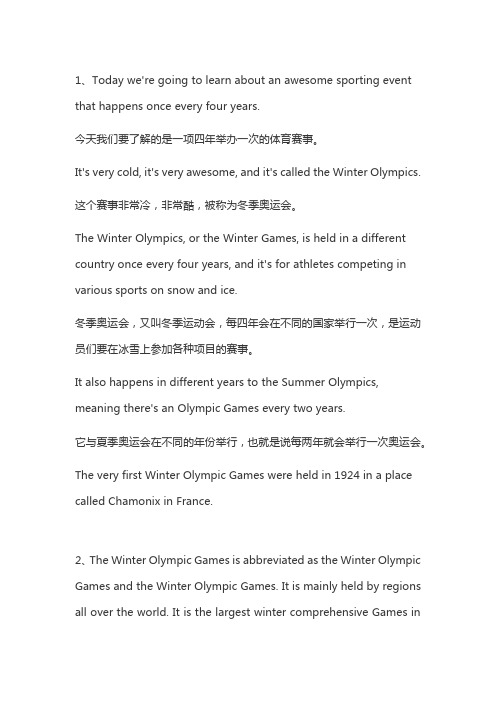
1、Today we're going to learn about an awesome sporting event that happens once every four years.今天我们要了解的是一项四年举办一次的体育赛事。
It's very cold, it's very awesome, and it's called the Winter Olympics. 这个赛事非常冷,非常酷,被称为冬季奥运会。
The Winter Olympics, or the Winter Games, is held in a different country once every four years, and it's for athletes competing in various sports on snow and ice.冬季奥运会,又叫冬季运动会,每四年会在不同的国家举行一次,是运动员们要在冰雪上参加各种项目的赛事。
It also happens in different years to the Summer Olympics, meaning there's an Olympic Games every two years.它与夏季奥运会在不同的年份举行,也就是说每两年就会举行一次奥运会。
The very first Winter Olympic Games were held in 1924 in a place called Chamonix in France.2、The Winter Olympic Games is abbreviated as the Winter Olympic Games and the Winter Olympic Games. It is mainly held by regions all over the world. It is the largest winter comprehensive Games inthe world. It is held every four years and has been held alternately with the summer Olympic Games since 1994. Participating countries are mainly distributed all over the world, including Europe, Africa, America, Asia and Oceania. Hosted by the International Olympic Committee. The number of sessions shall be calculated according to the actual number of sessions.。
用英语介绍冬奥会手抄报内容

用英语介绍冬奥会手抄报内容北京冬奥会开幕式于2月4日晚8时开始。
曾执导2008年夏季奥运会开幕式的国际知名导演张艺谋执导本次冬奥会开幕式。
在开始之前,有30余分钟的暖场环节。
据了解,北京冬奥会开幕式暖场表演以群众喜闻乐见的广场舞为主要形式,突出大众参与,没有邀请专业演员。
The opening ceremony of Beijing 2022 will start at 8 p.m. on February 4. Before that, a warm-up performance will be presented by square dancers aging from five to over 70 years old, expressing their excitement for the Olympic Winter Games, according to chief director Zhang Yimou.北京冬奥会的办赛要求是“简约、安全、精彩”(simple, safe, splendid),开幕式的创作也以此为标准。
在时长上,2008年北京奥运会开幕式为4个多小时,而此次开幕式则在100分钟左右,既是节俭办赛,也是出于对天气、防疫等因素的考虑(due to cold weather and the COVID-19 pandemic)。
在参与规模上,此次参与演出的人员约3000人,相比2008年北京奥运会时1.5万人大幅减少。
据了解,冬奥会开幕式进行了结构上的调整——不再以“板块”做区分,而是将文艺表演与仪式环节融为一体,融入科技创新(scientific and technological innovations)、低碳环保(low-carbon)和运动健康理念,体现时代特色。
“努力向世界奉献浪漫、唯美、温暖的盛会”,是导演团队对冬奥会开幕式的共同期待。
由于开幕式当天正好是中国传统二十四节气之一——立春,这一重要元素也将在舞台上有充分体现。
- 1、下载文档前请自行甄别文档内容的完整性,平台不提供额外的编辑、内容补充、找答案等附加服务。
- 2、"仅部分预览"的文档,不可在线预览部分如存在完整性等问题,可反馈申请退款(可完整预览的文档不适用该条件!)。
- 3、如文档侵犯您的权益,请联系客服反馈,我们会尽快为您处理(人工客服工作时间:9:00-18:30)。
1924年首次列入冬季奥运会比赛项目,包括:男 子自由式竞速赛、15公里古典式、30公里追逐赛、50 公里自由式集体出发、4x10公里接力、男子团体竞逐 赛;女子自由式竞速赛、10公里古典式、15公里追逐 赛、30公里自由式集体出发、4x5公里接力、女子团体 竞速赛。
snow events
3. 跳台滑雪(Ski Jumping) 跳台滑雪简称“跳雪”。就是运动员脚着特制的滑雪板,
沿着跳台的倾斜助滑道下滑。借助速度和弹跳力,使身体 跃入空中,使整个身体在空中飞行约4-5秒钟后,落在山坡 上。 跳台滑雪起源于挪威,又称跳雪,本是古时统治者处 罚犯人的刑法——将犯人两脚各缚一块雪板,从有雪的高 山上推下,如果犯人没有丧命,就可豁免死罪。
的滑雪狩猎演变而来。 它是越野滑雪和射击相结合的运动。要求运动员
身背专用小口径步枪,每滑行一段距离射击一次。滑 雪部分要求速度和力量,射击部分要求精准和控制, 选手要在最短时间内击中最多目标。
1960年,男子冬季两项成为美国斯阔谷冬奥会比 赛项目,1992年增设女子项目。
在女子项目中,德国和瑞典实力较强;男子项目 则群雄逐鹿:法国、俄罗斯、奥地利、挪威、德国和 美国均有实力出色的选手。
加拿大在冰球运动中处于霸主地位,2014年索契冬 奥会男子冰球决赛中,加拿大队以3比0战胜瑞典队。
ice events
3. 花样滑冰(Figure Skating) 美国人杰克森-海恩斯是现代花样滑冰的奠基人,
1860年,由他编排的融合芭蕾风格的冰上演出,令观 众大为惊叹。
花样滑冰在首届冬奥会上就已成为正式项目,共产 生男女单人和双人赛4枚金牌。运动员靠自身力量在冰 上滑行,尽情向观众展示耐力、速度、协调、柔韧、 灵活、平衡……等力与美的结合。
它将速度与技巧融合,运动员在滑行过程中左右盘旋, 粗犷中不失美感。
1936年,高山滑雪首次出现在德国加米施-帕滕基 兴冬奥会上。目前,该大项分为速度系列和技术系列, 共10枚金牌,包括男女滑降、回转、超级大回转、全 能(滑降/回转)。
美国和奥地利在该项目上极具竞争力。
snow events
2. 冬季两项(Biathlon) 冬季两项起源于斯堪的纳维亚半岛,由远古时代
包括男女空中技巧、雪上技巧和雪上芭蕾。 除了美国和加拿大在该项目上的瑜亮之争,中国队
也是自由式滑雪的后起之秀。索契冬奥会上,中国队 在自由式滑雪空中技巧项目中获得了女子银牌和男子 铜牌。
snow events
8.单板滑雪(Snowboarding) 单板滑雪起源于20世纪60年代中期的美国,又称
“冬季冲浪”。 1998年被列入冬奥会以来,其共设男女平行大回转、
无舵雪橇在1964年奥地利因斯布鲁克冬奥会中被列 为正式项目。从既往的赛绩来看,德国和奥地利更具 竞争力。
snow events
6. 自由式滑雪(Freestyle Skiing) 20世纪60年代,美国社会处于变革期,自由式滑雪
应运而生,充分彰显了年轻人的个性。 自由滑雪于1992年进入冬奥会,现共设6块金牌,
Host city
The 2022 Winter Olympic Games
sporting events in Winter Olympics
snow events & ice events
snow events
1. 高山滑雪(Alpine skiing) 高山滑雪起源于欧洲阿尔卑斯山区,又称山地滑雪。
单板滑雪越野赛和U型池6个比赛项目。 作为创始国,美国历来是单板滑雪领域的霸主。
ice events
1. 冰壶(Curling) 冰壶运动的历史超过500年,从1988年开始被正式纳
入冬奥会。该项目为团体赛,共两枚金牌。在预选赛 后,10支队伍先进行单循环赛,前四名进入半决赛, 争夺奖牌。
冰壶又有“冰上象棋”的别名,比赛时每队4名选手 轮流投掷冰壶两次,使其尽可能地接近圆心。
跳台滑雪共设置普通台男子单人、大台男子单人、大台 男子团体、普通台女子跳台4个小项。
跳雪要求参赛者身体前倾,与滑雪板尽量平行,充分 降低阻力;落地动作的质量对最终得分起决定作用。这项 运动视觉效果震撼,是勇敢、果断、沉着、机智的集中体 现。
奥地利一直在该项目中保持领先。
snow events
4. 越野滑雪(Cross-country Skiing) 越野滑雪借助滑雪用具,运用登山 、滑降、转弯、
加拿大、瑞典和英国在冰球项目中一直走在前列。
ice events
2. 冰球(Ice Hockey) 冰球起源于加拿大,又称冰上曲棍球。该项目产生
两块金牌,男子金牌在12支队伍中产生,女子金牌由8 支队伍角逐。
比赛时每队上场6人(前锋3人、后卫2人、守门员1 人)。冰球将多变的滑冰技艺和敏捷娴熟的曲棍球技 艺相结合,是对抗性较强的集体冰上运动。
俄罗斯和挪威都是.无舵雪橇(Luge) 无舵雪橇,也称平底雪橇、运动雪橇或短雪橇。雪橇
运动项目之一。一种仰面躺在雪橇上,双脚在前,通 过变换身体姿势来操纵雪橇高速回转滑降的运动。雪 橇为木制,底面有一对平行的金属滑板。滑板不得装 置能操纵滑板的舵和制动器。比赛中,选手的平均时 速可达130公里每小时,比赛计分采用累积制,单座滑 4次,赛期两天;双座滑2次,赛期一天;所用时间相 加,时间少者为胜。
速滑选手的时速可以超过60公里,号称人类不借助 机械设备能够达到的速度极限。
纵观历史,俄罗斯和德国在花样滑冰比赛中最具竞 争力。
ice events
4.速度滑冰(Speed Skating) 早在13世纪,荷兰的河道上就出现了速滑者,那时,
人们将钉在木板上的铁制冰刀当成交通工具。 男、女速滑分别于1924年、1960年被纳入冬奥会。
该项目共产生12枚金牌,分别为男女500米、1000米、 1500米、5000米,团体追逐赛,以及男子1万米、女 子3000米。
